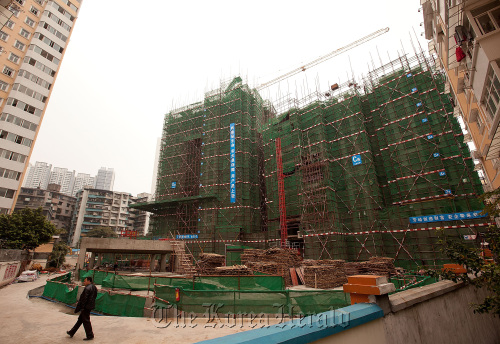A Chinese manufacturing index was higher than economists estimated in July, signaling the world’s second-biggest economy is withstanding higher interest rates and tightened credit.
The Purchasing Managers’ Index was at 50.7 for July compared with 50.9 in June, the China Federation of Logistics and Purchasing said in a statement Monday. That was more than every forecast in a Bloomberg News survey of 13 economists. The median estimate was for a reading of 50.2.

Construction work progresses in Haizhu district, Guangzhou, Guangdong province, China. (Bloomberg)
Monday’s data may ease concerns that Premier Wen Jiabao’s campaign to tame consumer and property prices will trigger a deeper slowdown that limits the nation’s contribution to global growth. The government needs to sustain domestic demand as a sluggish U.S. recovery and a sovereign debt crisis in Europe cap export demand.
“Growth is moderating as earlier tightening policies are biting,” Chang Jian, an economist at Barclays Capital in Hong Kong, said before the report. “But full-year expansion of around 9 percent remains achievable given the support from investment and consumption in the second half.”
A reading above 50 indicates an expansion. Apart from 2009, the index has declined each July since the series was first published in January 2005, previously released data shows. The gauge is based on a survey of purchasing managers in more than 820 companies in 20 industries and last dropped below 50 in February 2009.
China’s economy is slowing after the government raised interest rates, curbed lending, and limited home purchases and property development to rein in inflation that’s exceeded the government’s 4 percent ceiling every month this year.
Consumer prices climbed 6.4 percent in June, the most in three years, driven by a 14 percent gain in food costs. Economic growth slowed to 9.5 percent in the second quarter from a year earlier from a 9.7 percent increase in the first three months.
For the full year, expansion will moderate to 9.6 percent from 10.3 percent in 2010, the International Monetary Fund forecast in a July 21 report.
While the economy “remains on a solid footing,” it faces risks including the threat of faster-than-expected inflation, a real-estate bubble and bad loans from stimulus spending, the Washington-based lender said.
Ahead of Monday’s data, Credit Suisse AG said investors shouldn’t be overly concerned by any weakening in the manufacturing index.
“Solid consumption, helped by wage growth and tax cuts, should help keep the economy from a hard-landing,” Tao Dong, a Hong Kong-based economist at Credit Suisse said in a July 21 note.
Industrial output growth of 13 to 15 percent is possible for the rest of the year even as companies face pressure from rising raw material, energy and labor costs, Zhu Hongren, spokesman for the Ministry of Industry and Information Technology said at a briefing on July 21.
(Bloomberg)






